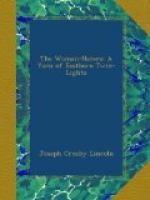The lightkeeper experimented with no more dogs, but he had evidently not forgotten the lifesaving man’s warning concerning possible thieves, for he purchased a big spring-lock in Eastboro and attached it to the door of the boathouse on the little wharf. The lock was, at first, a good deal more of a nuisance than an advantage, for the key was always being forgotten or mislaid, and, on one occasion, the door blew shut with Atkins inside the building, and he pounded and shrieked for ten minutes before his helper heard him and descended to the rescue.
June crawled by, and July came. Crawled is the proper word, for John Brown had never known days so long or weeks so unending as those of that early summer. The monotony was almost never broken, and he began to find it deadly. He invented new duties about the lights and added swimming and walks up and down the beach to his limited list of recreations.
The swimming he especially enjoyed. The cove made a fine bathing place, and the boathouse was his dressing room, though the fragrance of the ancient fish nets stored within it was not that of attar of roses. A cheap bathing suit was one of the luxuries Atkins had bought for him, by request, in Eastboro. Seth bought the suit under protest, for he scoffed openly at his helper’s daily bath.
“I should think,” the lightkeeper declared over and over again, “that you’d had salt water soak enough to last you for one spell; a feller that come as nigh drownin’ as you done!”
Seth did not care for swimming; the washtub every Saturday night furnished him with baths sufficient.
He was particular to warn his helper against the tide in the inlet: “The cove’s all right,” he said, “but you want to look out and not try to swim in the crick where it’s narrow, or in that deep hole by the end of the wharf, where the lobster car’s moored. When the tide’s comin’ in or it’s dead high water, the current’s strong there. On the ebb it’ll snake you out into the breakers sure as I’m settin’ here tellin’ you. The cove’s all right and good and safe; but keep away from the narrer part of the crick.”
Swimming was good fun, and walking, on pleasant days, was an aid in shaking off depression; but, in spite of his denials and his attempts at appearing contented, the substitute assistant realized that he was far from that happy condition. He did not want to meet people, least of all people of his own station in life—his former station. Atkins was a fine chap, in his way; but . . . Brown was lonely . . . and when one is lonely, one thinks of what might have been, and, perhaps, regrets. Regrets, unavailing regrets, are the poorest companions possible.
The lightkeeper, too, seemed lonely, which, considering his years of experience in his present situation, was odd. He explained his loneliness one evening by observing that he cal’lated he missed the painting chaps.
“What painting chaps?” asked Brown.




